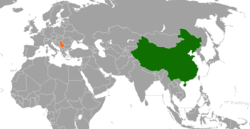| Dates | Visit |
|---|
| November 2000 | Visit by Foreign Minister Živadin Jovanović, to Beijing |
| December 2000 | Visit by Foreign Minister Tang Jiaxuan, to Belgrade |
| August 2001 | Visit by Deputy Prime Minister Miroljub Labus, to Beijing |
| January 2002 | Visit by President Vojislav Koštunica, to Beijing |
| April 2003 | Visit by Foreign Minister Goran Svilanović, to Beijing |
| April 2003 | Visit by Deputy Foreign Minister Liu Guchang, to Belgrade |
| November 2003 | Visit by Prime Minister Zoran Živković, to Beijing |
| September 2004 | Visit by Defence Minister Prvoslav Davinić, to Beijing |
| October 2004 | Visit by CPPCC Vice Chair Liu Yandong, to Belgrade |
| February 2005 | Visit by President Boris Tadić, to Beijing |
| May 2005 | Visit by Deputy Foreign Minister Zhang Yesui, to Belgrade |
| May 2005 | Visit by First Secretary of the CP City Committee Liu Qi, to Belgrade |
| May 2005 | Visit by Foreign Minister Li Zhaoxing, to Belgrade |
| October 2005 | Visit by Foreign Minister Vuk Drašković, to Beijing |
| December 2005 | Visit by Minister for Human and Minority Rights Rasim Ljajić, to Beijing |
| May 2006 | Visit by Mayor of Belgrade Nenad Bogdanović, to Beijing |
| May 2006 | Visit by Director of the Security Intelligence Agency Director Rade Bulatović, to Beijing |
| August 2006 | Visit by State Counsellor Tang Jiaxuan, to Belgrade |
| April 2007 | Visit by Vice-Premier Hui Liangyu, to Belgrade |
| April 2007 | Visit by Chief of General Staff of the Serbian Armed Forces Gen. Zdravko Ponoš, to Beijing |
| September 2007 | Visit by Foreign Minister Vuk Jeremić, to Beijing |
| August 2008 | Visit by President Boris Tadić, to Beijing |
| September 2008 | Visit by Chief of the Joint Staff Department of the People Liberation Army Gen. Chen Bingde, to Belgrade |
| November 2008 | Visit by Defence Minister Dragan Šutanovac, to Beijing |
| April 2009 | Visit by Deputy Prime Minister Božidar Đelić, to Beijing |
| August 2009 | Visit by President Boris Tadić, to Beijing |
| June 2010 | Visit by Prime Minister Mirko Cvetković, to Beijing |
| July 2010 | Visit by Chairman of the Standing Committee of the National People's Congress Wu Bangguo, to Belgrade |
| December 2010 | Visit by Minister of Diaspora Srđan Srećković, to Beijing |
| May 2011 | Visit by Foreign Minister Yang Jiechi, to Belgrade |
| August 2011 | Visit by President of the National Assembly Slavica Đukić Dejanović, to Beijing |
| August 2013 | Visit by President Tomislav Nikolić to Beijing, Hangzhou and Shanghai |
| December 2014 | Visit by Premier Li Keqiang, to Belgrade |
| September 2015 | Visit by President Tomislav Nikolić, to Beijing |
| November 2015 | Visit by Prime Minister Aleksandar Vučić, to Suzhou |
| June 2016 | Visit by CCP General Secretary & President Xi Jinping, to Belgrade and Smederevo [15] |
| September 2018 | Visit by President Aleksandar Vučić, to Tianjin |
| October 2023 | Visit by President Aleksandar Vučić, to Beijing [15] |
| May 2024 | Visit by CCP General Secretary & President Xi Jinping, to Belgrade [15] |

